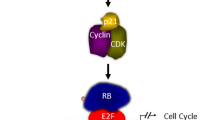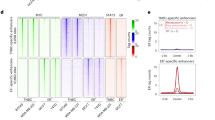Abstract
Metastasis-associated tumor antigen 1 (MTA1), a component of the nucleosome remodeling and deacetylating (NuRD) complex is routinely upregulated in several cancers. In the present study, we investigated the potential role of MTA1 in BRCA1 transcriptional repression and subsequent chromosomal instability. MTA1–NuRD complex was found to negatively regulate BRCA1 transcription by physically associating with an atypical estrogen-responsive element (ERE) on the BRCA1 promoter. Moreover, MTA1 and HDAC complex recruited to the ERE of BRCA1 promoter in an ER α-dependent manner. Accordingly, BRCA1 protein levels were enhanced by silencing of either MTA1 expression or by treatment with the specific histone deacetylase inhibitor trichostatin A. MTA1's strong repressive effects on BRCA1 expression was supported by our observation that cells stably overexpressing MTA1 showed centrosome amplification which has been long implicated as a phenotype for BRCA1 repression. Accordingly, overexpression of BRCA1 in cells stably over expressing MTA1 resulted in restoration of normal centrosome numbers. Together, these findings strongly implicate MTA1 in the transcriptional repression of BRCA1 leading to abnormal centrosome number and chromosomal instability.
This is a preview of subscription content, access via your institution
Access options
Subscribe to this journal
Receive 50 print issues and online access
$259.00 per year
only $5.18 per issue
Buy this article
- Purchase on Springer Link
- Instant access to full article PDF
Prices may be subject to local taxes which are calculated during checkout







Similar content being viewed by others
Abbreviations
- BRCA1 :
-
breast cancer susceptibility gene 1
- ChIP:
-
chromatin immunoprecipitation
- ERα:
-
estrogen receptor α
- ERE:
-
estrogen-responsive element
- HDAC:
-
histone deacetylase
- MTA1:
-
metastasis- tumor antigen 1
- NuRD complex:
-
nucleosome remodeling and deacetylase complex
- TSA:
-
trichostatin A
References
Bagheri-Yarmand R, Talukder AH, Wang RA, Vadlamudi RK, Kumar R . (2004). Metastasis-associated protein 1 deregulation causes inappropriate mammary gland development and tumorigenesis. Development 131: 3469–3479.
Baker KM, Wei G, Schaffner AE, Ostrowski MC . (2003). Ets-2 and components of mammalian SWI/SNF form a repressor complex that negatively regulates the BRCA1 promoter. J Biol Chem 278: 17876–17884.
Balasenthil S, Broaddus RR, Kumar R . (2006). Expression of metastasis-associated protein 1 (MTA1) in benign endometrium and endometrial adenocarcinomas. Hum Pathol 37: 656–661.
Birgisdottir V, Stefansson OA, Bodvarsdottir SK, Hilmarsdottir H, Jonasson JG, Eyfjord JE . (2006). Epigenetic silencing and deletion of the BRCA1 gene in sporadic breast cancer. Breast Cancer Res 8: R38.
Chabalier C, Lamare C, Racca C, Privat M, Valette A, Larminat F . (2006). BRCA1 downregulation leads to premature inactivation of spindle checkpoint and confers paclitaxel resistance. Cell Cycle 5: 1001–1007.
Chen XW, Arciero CA, Godwin AK . (2006). BRCA1-associated complexes: new targets to overcome breast cancer radiation resistance. Expert Rev Anticancer Ther 6: 187–196.
D’Assoro AB, Lingle WL, Salisbury JL . (2002). Centrosome amplification and the development of cancer. Oncogene 21: 6146–6153.
Deng CX . (2006). BRCA1: cell cycle checkpoint, genetic instability, DNA damage response and cancer evolution. Nucleic Acids Res 34: 1416–1426.
Fukasawa K, Choi T, Kuriyama R, Rulong S, Vande Woude GF . (1996). Abnormal centrosome amplification in the absence of p53. Science 271: 1744–1747.
Fukasawa K . (2005). Centrosome amplification, chromosome instability and cancer development. Cancer Lett 230: 6–19.
Hamatsu T, Rikimaru T, Yamashita Y, Aishima S, Tanaka S, Shirabe K et al. (2003). The role of MTA1 gene expression in human hepatocellular carcinoma. Oncol Rep 10: 599–604.
Indraccolo S, Tisato V, Agata S, Moserle L, Ferrari S, Callegaro M et al. (2006). Establishment and characterization of xenografts and cancer cell cultures derived from BRCA1-/- epithelial ovarian cancers. Eur J Cancer 42: 1475–1483.
Jang KS, Paik SS, Chung H, Oh YH, Kong G . (2006). MTA1 overexpression correlates significantly with tumor grade and angiogenesis in human breast cancers. Cancer Sci 97: 374–379.
Kanai M, Tong WM, Sugihara E, Wang ZQ, Fukasawa K, Miwa M . (2003). Involvement of poly(ADP-ribose) polymerase 1 and poly(ADP-ribosyl)ation in regulation of centrosome function. Mol Cell Biol 23: 2451–2462.
Ko MJ, Murata K, Hwang DS, Parvin JD . (2006). Inhibition of BRCA1 in breast cell lines causes the centrosome duplication cycle to be disconnected from the cell cycle. Oncogene 25: 298–303.
Kumar R, Wang RA, Bagheri-Yarmand R . (2003). Emerging roles of MTA family members in human cancers. Semin Oncol 30: 30–37.
Magdinier F, Ribieras S, Lenoir GM, Frappart L, Dante R . (1998). Downregulation of BRCA1 in human sporadic breast cancer; analysis of DNA methylation patterns of the putative promoter region. Oncogene 17: 3169–3176.
Martin MD, Hilsenbeck SG, Mohsin SK, Hopp TA, Clark GM, Osborne CK et al. (2006). Breast tumors that overexpress nuclear metastasis-associated 1 (MTA1) protein have high recurrence risks but enhanced responses to systemic therapies. Breast Cancer Res Treat 95: 7–12.
Mazumdar A, Wang RA, Mishra SK, Adam L, Bagheri-Yarmand R, Mandal M et al. (2001). Transcriptional repression of oestrogen receptor by metastasis-associated protein 1 corepressor. Nat Cell Biol 3: 30–37.
Mullan PB, Quinn JE, Harkin DP . (2006). The role of BRCA1 in transcriptional regulation and cell cycle control. Oncogene 25: 5854–5863.
Nawa A, Nishimori K, Lin P, Maki Y, Moue K, Sawada H et al. (2000). Tumor metastasis-associated human MTA1 gene: its deduced protein sequence, localization, and association with breast cancer cell proliferation using antisense phosphorothioate oligonucleotides. J Cell Biochem 79: 202–212.
Ouchi T . (2006). BRCA1 phosphorylation—Biological consequences. Cancer Biol Ther 5: 470–475.
Rio PG, Maurizis JC, Peffault DL, Bignon YJ, Bernard-Gallon DJ . (1999). Quantification of BRCA1 protein in sporadic breast carcinoma with or without loss of heterozygosity of the BRCA1 gene. Int J Cancer 80: 823–826.
Rosen EM, Fan SJ, Ma YX . (2006). BRCA1 regulation of transcription. Cancer Lett 236: 175–185.
Simbulan-Rosenthal CM, Rosenthal DS, Luo R, Li JH, Zhang J, Smulson ME . (2001). Inhibition of poly(ADP-ribose) polymerase activity is insufficient to induce tetraploidy. Nucleic Acids Res 29: 841–849.
Starita LM, Parvin JD . (2003). The multiple nuclear functions of BRCA1: transcription, ubiquitination and DNA repair. Curr Opin Cell Biol 15: 345–350.
Starita LM, Machida Y, Sankaran S, Elias JE, Griffin K, Schlegel BP et al. (2004). BRCA1-dependent ubiquitination of gamma-tubulin regulates centrosome number. Mol Cell Biol 24: 8457–8466.
Talukder AH, Mishra SK, Mandal M, Balasenthil S, Mehta S, Sahin AA et al. (2003). MTA1 interacts with MAT1, a cyclin-dependent kinase-activating kinase complex ring finger factor, and regulates estrogen receptor transactivation functions. J Biol Chem 278: 11676–11685.
Toh Y, Kuwano H, Mori M, Nicolson GL, Sugimachi K . (1999). Overexpression of metastasis-associated MTA1 mRNA in invasive oesophageal carcinomas. Br J Cancer 79: 1723–1726.
Toh Y, Pencil SD, Nicolson GL . (1994). A novel candidate metastasis-associated gene, mta1, differentially expressed in highly metastatic mammary adenocarcinoma cell lines. cDNA cloning, expression, and protein analyses. J Biol Chem 269: 22958–22963.
Turner NC, Reis-Filho JS, Russell AM, Springall RJ, Ryder K, Steele D et al. (2007). BRCA1 dysfunction in sporadic basal-like breast cancer. Oncogene 26: 2126–2132.
Weaver Z, Montagna C, Xu X, Howard T, Gadina M, Brodie SG et al. (2002). Mammary tumors in mice conditionally mutant for Brca1 exhibit gross genomic instability and centrosome amplification yet display a recurring distribution of genomic imbalances that is similar to human breast cancer. Oncogene 21: 5097–5107.
Xu CF, Chambers JA, Solomon E . (1997). Complex regulation of the BRCA1 gene. J Biol Chem 272: 20994–20997.
Yarden RI, Papa MZ . (2006). BRCA1 at the crossroad of multiple cellular pathways: approaches for therapeutic interventions. Mol Cancer Ther 5: 1396–1404.
Acknowledgements
This study was supported by National Institutes of Health Grant CA 098823 and CA65746 to RK
Author information
Authors and Affiliations
Corresponding author
Additional information
Supplementary Information accompanies the paper on the Oncogene website (http://www.nature.com/onc).
Rights and permissions
About this article
Cite this article
Molli, P., Singh, R., Lee, S. et al. MTA1-mediated transcriptional repression of BRCA1 tumor suppressor gene. Oncogene 27, 1971–1980 (2008). https://doi.org/10.1038/sj.onc.1210839
Received:
Revised:
Accepted:
Published:
Issue Date:
DOI: https://doi.org/10.1038/sj.onc.1210839
Keywords
This article is cited by
-
Metastasis-associated protein 1: A potential driver and regulator of the hallmarks of cancer
Journal of Biosciences (2022)
-
Identification of potential inhibitory analogs of metastasis tumor antigens (MTAs) using bioactive compounds: revealing therapeutic option to prevent malignancy
Molecular Diversity (2022)
-
Protein kinase D1 regulates subcellular localisation and metastatic function of metastasis-associated protein 1
British Journal of Cancer (2018)
-
Checkpoint Kinase 1 Expression Predicts Poor Prognosis in Nigerian Breast Cancer Patients
Molecular Diagnosis & Therapy (2018)
-
Neuroprotective effects of a chromatin modifier on ischemia/reperfusion neurons: implication of its regulation of BCL2 transactivation by ERα signaling
Cell and Tissue Research (2016)



